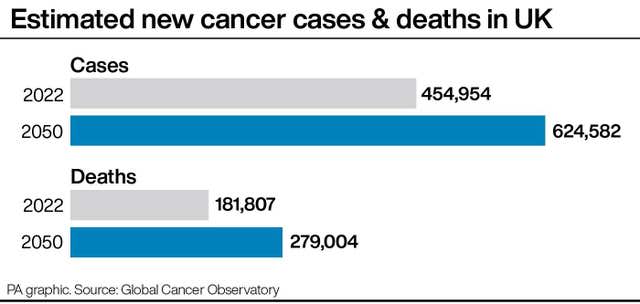A new mRNA cancer vaccine, made by pharmaceutical company Moderna, is being tested in British patients.
The mRNA technology – which has been adapted to make Covid-19 shots – helps the body recognize and fight cancer cells.
Experts believe these vaccines could lead to a new generation of ‘off-the-shelf’ cancer therapies.
Once in the body, the mRNA (a genetic material) ‘teaches’ the immune system how cancer cells differ from healthy cells and mobilizes it to destroy them.
mRNA cancer vaccines from companies like BioNTech, Merck and Moderna have been tested in small trials around the world, with promising results.
In some cases, vaccines are made specifically for the patient in the laboratory using their own genetic information, while others are more general vaccines that target specific types of cancer.
In the latest development, British patients are testing a vaccine called mRNA-4359 as part of an early-stage clinical trial, which will initially look at both safety and effectiveness.
The vaccine is intended for people with advanced melanoma, lung cancer and other forms of solid tumor cancer.
An 81-year-old man, taking part in the trial by Imperial College London and Imperial College Healthcare NHS Trust, was the first British person to receive the vaccine at Hammersmith Hospital in late October.
The Surrey man, who did not want to be named, has malignant melanoma skin cancer that is not responding to treatment.
He said: “I had another immunotherapy, I had radiotherapy, the only thing I didn’t get was chemotherapy. So the options were: do nothing and wait, or participate and do something.
“I am extremely grateful to the hospitals and the individuals who conduct these studies.
“Somehow we have to change the fact that one in two people will develop cancer at some point in their lives, and we have to increase the odds.”

The trial will test the vaccine alone and in combination with an existing drug pembrolizumab, an approved immunotherapy treatment also known as Keytruda.
Between 40 and 50 patients are being recruited across the world for the study, known as Mobilize, including in London, Spain, the US and Australia, although it could be expanded.
Dr. Kyle Holen, head of development, therapeutics and oncology at Moderna, told the PA news agency that the vaccine could potentially treat a range of cancers.
He said: “We are currently studying both melanoma patients and lung cancer patients, but we believe this vaccine in the Mobilize trial has an opportunity to treat many other cancers.
“We believe it could be effective in head and neck cancer, we believe it could be effective in bladder cancer, we believe it could be effective in kidney cancer.
“So there are many types of cancer where we think this vaccine could be effective.
“But we’ll start with the two that we think have the greatest chance of being effective, which are melanoma and lung cancer.”
Dr. David Pinato, medical oncologist at Imperial College Healthcare NHS Trust, and researcher on the UK arm of the study, told PA that cancer vaccines differ from immunotherapies, which also help the immune system ‘see’ and attack cancer.
He said: “Current immunotherapies remove the invisibility cloak that allows cancer to hide in the body, but this removal is highly non-specific.
“The appeal of cancer vaccines is that you can make it much more specific – you can essentially give the immune system written instructions.
“It’s almost like an identification of the tumor cells, which is more precise.”
He said the advantage of mRNA technology is that it “lets your own body produce those instructions.”
He added: “The fact that your body produces them wakes up the immune system, it is even more active.”
He said the vaccine being tested in the trial is a “off-the-shelf vaccine” and not one tailor-made for each individual patient.
While personalized vaccines can be very effective, it can take weeks to create and rely on a large tumor sample.
There is also not currently enough data to say whether personalized vaccines are actually better than broader cancer vaccines, he said.
The Moderna vaccine, he added, looks at specific characteristics of a number of tumors.
“It’s really about looking at what is the most common hit that you can target in cancer?,” he said.
“And so that has incredible benefits in terms of the turnaround time, the fact that you can make doses of the vaccines in advance, even before you meet the patient. That’s really the advantage.”


Dr. Pinato said it is unclear why some patients benefit from immunotherapy and cancer vaccines while others do not.
“My educated guess, knowing what I know about cancer immunotherapy, is that the interaction between the tumor and the immune system is very complex,” he said.
For example, some types of lung cancer respond much better than others.
“It could be that some patients may not be able to use those vaccines properly, so the immune system is still so low that it would not benefit even with precise instructions,” he added.
“I think now that we’ve developed a number of cancer drugs, there will never really be one that does everything.”
Professor Peter Johnson, NHS national clinical director for cancer, said the NHS is “at the forefront of testing cancer vaccines”.
He added: “We all know how worrying a cancer diagnosis can be for people and their loved ones, but access to these groundbreaking studies – among other innovations to diagnose and treat cancer earlier – offers hope, and we expect there will be thousands more will follow. patients who will participate in these types of studies in the coming years.”
Health and Social Care Minister Victoria Atkins said: “This vaccine has the potential to save even more lives while revolutionizing the way we treat this terrible disease with therapies that are more effective and less toxic to the system. ”